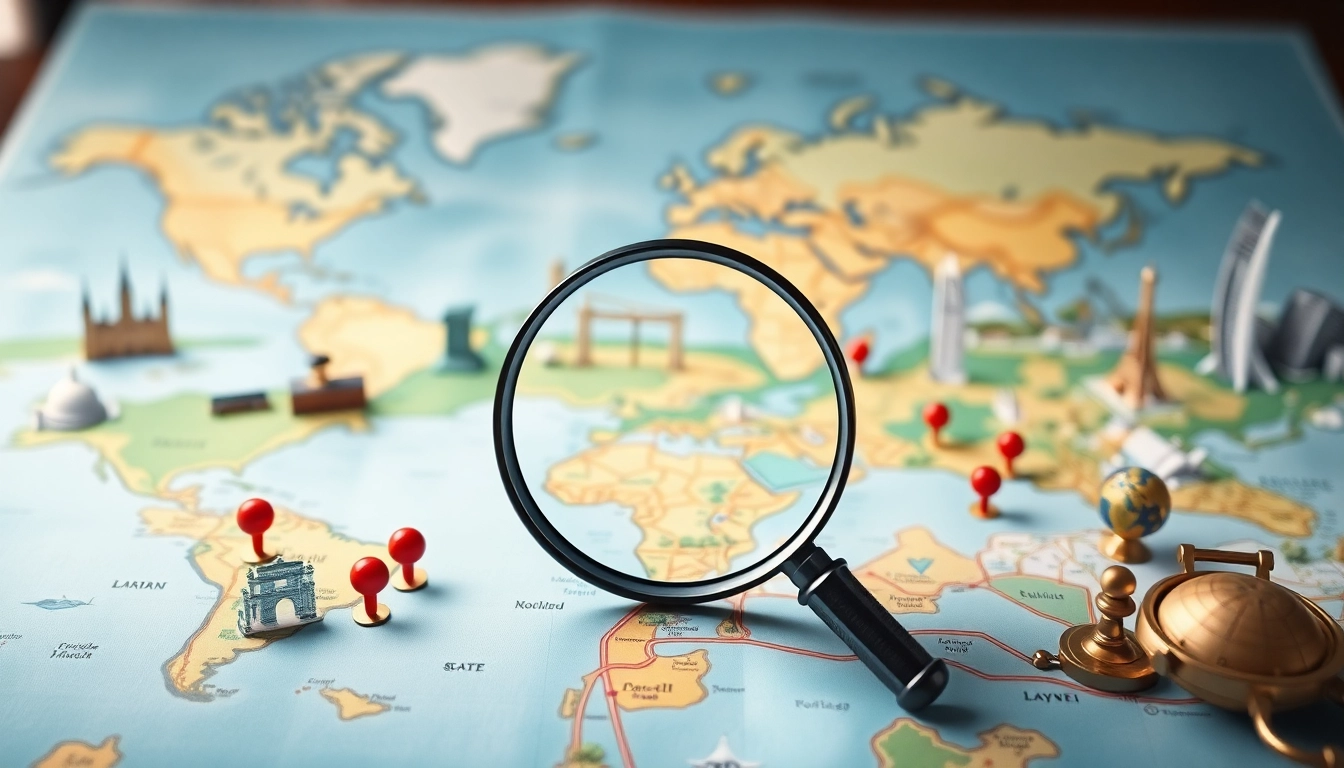Defining Locations in Mapping
What are Locations?
Locations refer to specific places or positions in geographical context. They can be marked on maps, described with coordinates, or identified through cultural distinctions. In the modern world, understanding locations is crucial due to their relevance in mapping, navigation, and even digital marketing strategies. Every location has attributes that define it, such as latitude and longitude, which help in pinpointing exact positions worldwide. Furthermore, locations can encompass anything from a single address to vast geographical areas, contributing richly to planning, logistics, and community orientation.
The Importance of Accurate Locations
Accurate locations play a vital role in various sectors, from ensuring the efficient delivery of services to facilitating personal safety. In domain areas such as disaster management, precise location data can mean the difference between successful evacuations and catastrophic consequences. Moreover, businesses leverage accurate location data to optimize their service areas, ensuring they meet customer needs effectively. For instance, enhanced mapping services that utilize GPS and other technologies improve the accuracy of locations, making them indispensable for applications like ride-sharing or food delivery. Investing in location accuracy reduces operational costs and enhances customer satisfaction.
Types of Locations: Geographic and Cultural
When discussing locations, it’s essential to differentiate between geographic and cultural locations. Geographic locations are defined by specific coordinates or mapping systems, encompassing features such as terrain types, climates, and natural resources. On the other hand, cultural locations reflect the societal influences surrounding a place, including historical significance, community demographics, and local traditions. Understanding both aspects provides a more holistic view of how locations influence human behavior, marketing practices, and spatial development.
How to Effectively Use Locations in Navigation
Tools for Identifying Locations
Numerous tools are available for identifying locations, making navigation more straightforward than ever. Tools like GPS devices, smartphones, and dedicated mapping applications—like Google Maps—offer real-time location tracking and mapping. With these tools, users can search specific locations, receive directions, and access invaluable data on nearby amenities. Distinct features such as traffic conditions and landmark recognition further enhance the navigation experience, allowing for precise planning and execution of travel routes.
Interpreting Maps and Location Markers
Reading and interpreting maps is a skill anyone can acquire with practice. Maps convey location information through symbols, legends, and scales, allowing users to understand distances and navigate through spaces effectively. Location markers, often represented by pins or markers on electronic maps, provide additional context about specific places of interest. Learning to discern these markers—whether they indicate businesses, parks, or points of interest—greatly enhances the navigation experience, enabling one to discover and utilize resources efficiently.
Technology’s Role in Location Navigation
Modern technology significantly influences how we navigate locations. With advancements in augmented reality (AR) and virtual reality (VR), users can visualize routes and explore locations in a more immersive manner than ever before. Additionally, mobile applications incorporating AI algorithms provide tailored navigation experiences, adapting routes in real-time based on changing conditions such as traffic congestion or road closures. These developments exemplify how technology not only elevates navigation efficacy but enhances user engagement by presenting information in dynamic formats.
Best Practices for Managing Locations
Organizing Your Location Data
Efficient organization of location data is paramount for both individuals and businesses seeking to streamline operations. Employing databases to categorize locations based on criteria—such as frequency of use, geographic features, or relevance—can vastly improve retrieval times and operational efficiency. For businesses, using tools such as Geographic Information Systems (GIS) facilitates comprehensive analysis of spatial data, facilitating informed decisions regarding resource allocation and service areas.
Digital Solutions for Location Management
A multitude of digital solutions are available for effective location management. Cloud-based software allows easy access to location data from various devices, promoting collaboration among teams. Moreover, integrating location data with Customer Relationship Management (CRM) systems enhances personalization for marketing strategies, allowing businesses to target communications based on the customer’s proximity to specific locations. These advancements not only streamline operations but also enhance customer engagement through tailored experiences.
Strategies to Improve Location Accuracy
Improving location accuracy requires a multifaceted approach that includes regularly updating data protocols and utilizing advanced technologies. Businesses should invest in high-quality GPS systems, performing periodic audits to ensure location data remains current. Partnering with data providers who specialize in location services can also enhance accuracy, making it crucial to establish reliable sources for data. Additionally, encouraging user feedback on location services can highlight areas of improvement, ensuring that solutions remain user-centered.
Common Challenges with Locations
Dealing with Location Data Inaccuracies
Location data inaccuracies pose significant challenges for users and organizations. Factors such as outdated maps, shifts in geological features, and human error can lead to incorrect location assessments. Establishing proactive data management strategies—such as regular updates and user input verification—can substantially mitigate these inaccuracies. Moreover, utilizing multiple data sources can cross-verify information, ensuring the accuracy and reliability of location-dependent services.
Privacy Concerns Related to Location Sharing
The sharing of location data raises vital privacy concerns that both individuals and organizations must navigate. Users must be aware of how their location data is utilized by different applications, especially concerning smartphones and wearables. Employing transparent data usage policies and offering users options to manage their privacy settings can foster trust and confidence in location-sharing applications. Organizations must prioritize data protection to mitigate risks while balancing the need for operational insights derived from location behaviors.
Accessibility Issues in Certain Locations
Accessibility challenges in various locations can hinder navigation and service provision. Geographic barriers, such as rugged terrains or congested urban environments, often complicate access to significant areas. Implementing technology solutions, like drone deliveries or enhanced public transit routes, can help alleviate some of these issues. Moreover, advocating for improved infrastructure in underserved locations can lead to enhanced connectivity and accessibility, ultimately benefiting communities and businesses alike.
Looking Ahead: The Future of Locations
Innovations in Location Technology
The future of location technology is rife with innovations poised to revolutionize how individuals and organizations interact with their surroundings. Blockchain technology promises to enhance location-based data security, providing immutable records that enhance trust. Furthermore, advancements in AI will enable predictive location analytics, anticipating user needs and preferences based on past behaviors. The convergence of these technologies will facilitate unparalleled experiences, driving efficiency and engagement across various sectors.
The Impact of AI on Location Services
Artificial Intelligence is set to redefine location services by offering enhanced personalization and efficiency. Algorithms will analyze vast amounts of data to identify patterns and recommend optimal services tailored to individual users. For instance, AI-driven mapping applications will provide real-time adjustments that reflect user preferences, guiding them to preferred locations or service providers. The integration of AI will also enable businesses to assess service areas more dynamically, leading to improved operational decisions and resource allocation.
Predictions for Location-Based Marketing
Location-based marketing is anticipated to undergo transformational changes with the rise of new technologies. Enhanced geo-targeting strategies will allow for more personalized marketing messages based on user locations and behavior patterns. Companies can leverage advanced analytics to deliver timely promotions aligned with user preferences, ultimately improving conversion rates. As location technologies continue to advance, businesses that harness these innovations effectively will gain a competitive edge in the market.
Understanding Locations is essential in today’s interconnected world, influencing navigation, marketing, and community engagement. Through mastering location concepts, organizations and individuals can harness the full potential of location data, addressing challenges and leveraging opportunities for advancement.



